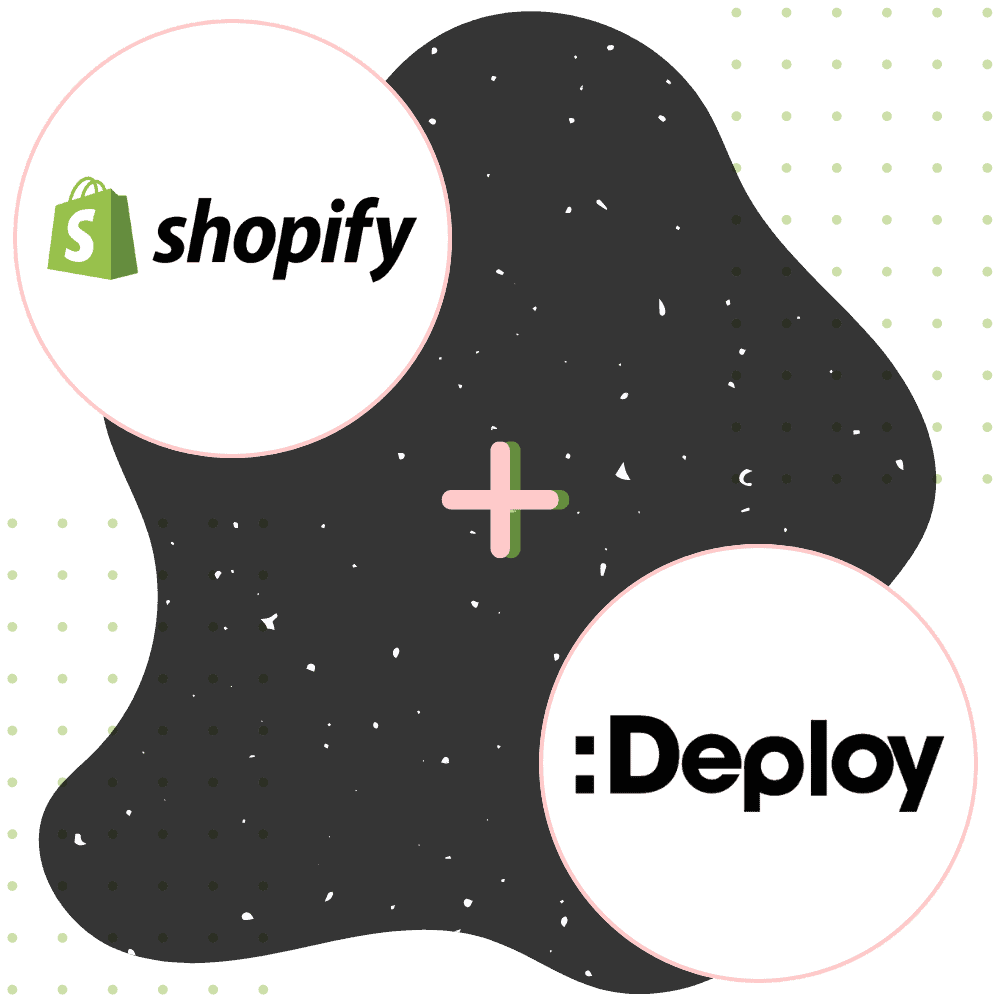Award Winning Shopify eCommerce Agency.
Deploy are a leading Shopify agency in Stoke-on-Trent, Staffordshire producing, migrating, integrating, supporting and marketing Shopify stores that smash targets for small to large size businesses.




What is Shopify?
Shopify is a complete ecommerce platform empowering individuals to kickstart, operate, and expand their businesses with ease. With Shopify, you can create and customise online stores, manage sales, engage with customers through marketing efforts, and facilitate payments online or in brick-and-mortar establishments. Shopify’s reputation as a commerce leader comes from listening to the experiences of millions of business owners.
Shopify has developed cutting-edge features and products, such as AI-driven marketing tools and enhanced payment solutions, that drive current business operations and will influence the evolution of commerce in the future. The Shopify App Store consists of extensions, designed to be easily installed and used in your Shopify store without requiring complex setup or configuration, so you can ‘plug & play’.
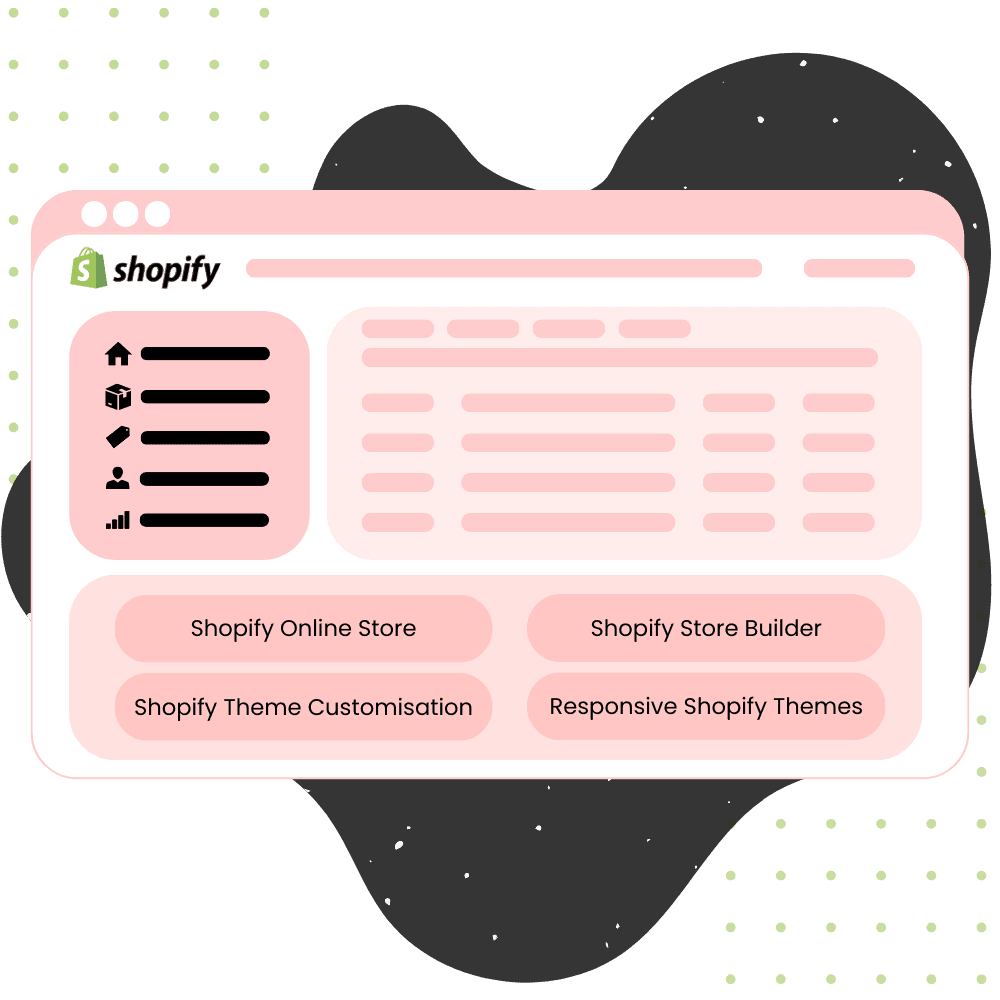

Rapid eCommerce Growth with Shopify.
We aim to help businesses elevate their ecommerce performance to the next level, strengthening their ability to compete while making ecommerce operations easier to run, manage, and market. Many choices are available to facilitate that journey, and Shopify is a key technology.
Since 2006, Shopify has grown to become a front runner in its field, with 1.75m merchants worldwide and currently over 22,000 in the UK alone.
And with over a decade of experience with a range of ecommerce businesses, from start ups through to established businesses, we’re adept at using the Shopify platform to design stores that drive performance, usability and functionality to new levels.
We go through a diligent production process, ensuring the end result is primed for the increase in performance you’re looking for.
Comprehensive Shopify Migration Services.
Migrating your ecommerce store is a decision never taken lightly. There’s a lot to consider, and if you’re an established ecommerce business, a seamless transition from one platform to another is crucial.
There are lots of reasons to migrate to Shopify and it could very well be a great choice for you. At Deploy, we have vast experience migrating stores from platforms including PrestaShop, Wix, Shopify, Magento, Woo Commerce and Big Commerce to Shopify.
With over a decade of experience in migrating stores from platform to platform. We mitigate the risk with a thorough migration process and remain vigilant to spot and address challenges from project kick-off through to post-launch.
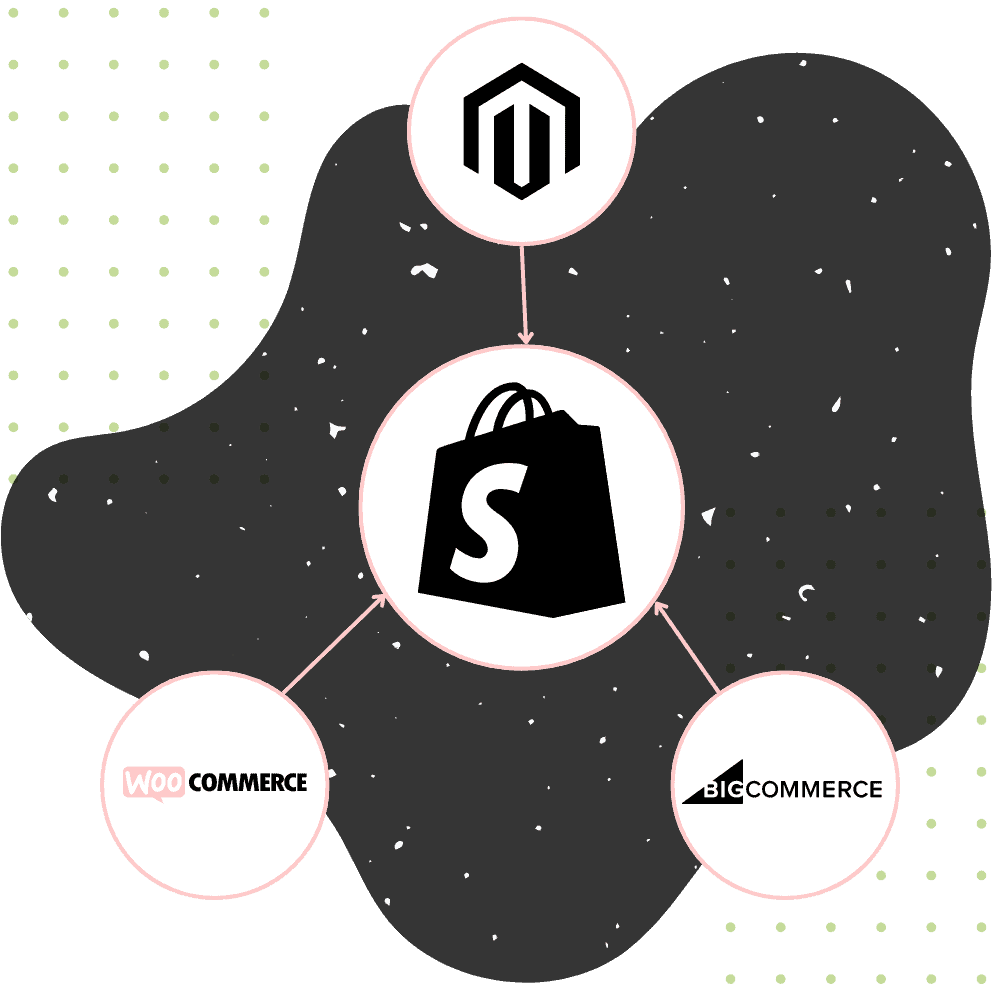

Migrating From
Magento
15+ years experience with the Magento platform places us perfectly to handle the migration to Shopify from Magento, especially when it comes to migrating data, which is always a core consideration. Further to that, there will naturally be points of difference between an open code platform and a SaaS solution, so we map the key features and functions at a technical level, and advise how best to maintain the functionality that is critical to retaining a positive user experience and minimising disruption.

Migrating From Woo Commerce
Woo Commerce has a large customer base primarily because it is specifically designed to integrate seamlessly with WordPress, one of the most popular content management systems in the world.
While Woo Commerce is a very respectable solution, we have identified several reasons why a SaaS platform like Shopify better meets the advanced requirements of customers looking to progress to the next phase of their ecommerce journey.

Migrating From Proprietary Solutions
For various reasons, a purpose built solution can be in place.
Proprietary solutions are often used by established ecommerce businesses designed with a specific function in mind, but many companies now prefer popular platforms because they are easier to use, cost effective, and scalable.
Deploy can help you maintain key features and take advantage of the benefits that platforms like Shopify offer.
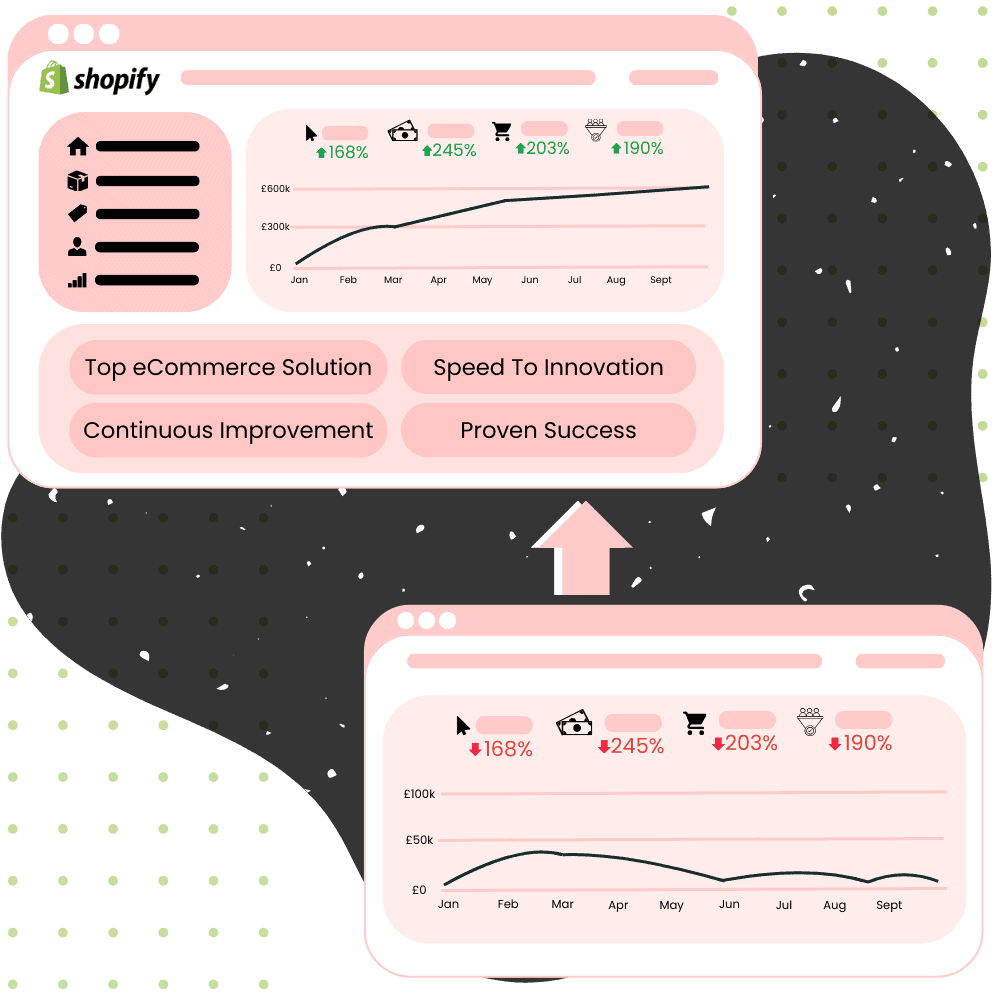
Migrating to Shopify is a Gamechanger.
For many businesses, migrating to Shopify can be a gamechanger. The platform brings a wealth of functionality, either natively within the platform, or within easy reach via a strong collection of trusted apps. This can be a new experience for some businesses who have struggled with a more complex environment and some of the challenges that can bring.
At Deploy, we know how to successfully manage a Shopify project, taking into consideration your unique commercial circumstances. Our diligent approach to Shopify migration project management, combined with our platform knowledge and vast ecommerce experience, means we’re adept at ensuring you maintain the key functionality and build upon it. So your customer experience is upgraded and your ability to manage and evolve it is strengthened.
Another important aspect of any Shopify migration is finding the right balance between self sufficiency and 3rd party support. This balance allows you to concentrate on what matters most and make the best use of your time.
Integrating with Shopify.
Your ecommerce platform is an important element of your ecommerce operation. But the platform alone doesn’t cater for all of the functionality vital to running a successful ecommerce channel.
Various customer-facing ecommerce functionalities, like personalisation, shipping and payment gateways to name a few, can all rely upon 3rd party technologies. And if you run physical stores and warehouses then, EPOS, WMS, ERP can all become vital. Not to mention the plethora of digital marketing technologies that enable you to gain visitors.
Seamless integrations are a must for many businesses. And with Shopify’s vast array of apps, compatible connectors and middleware, complex requirements can be catered for. Add in Deploy’s 12+ years of undertaking projects involving numerous integration points, and you have a recipe for success.
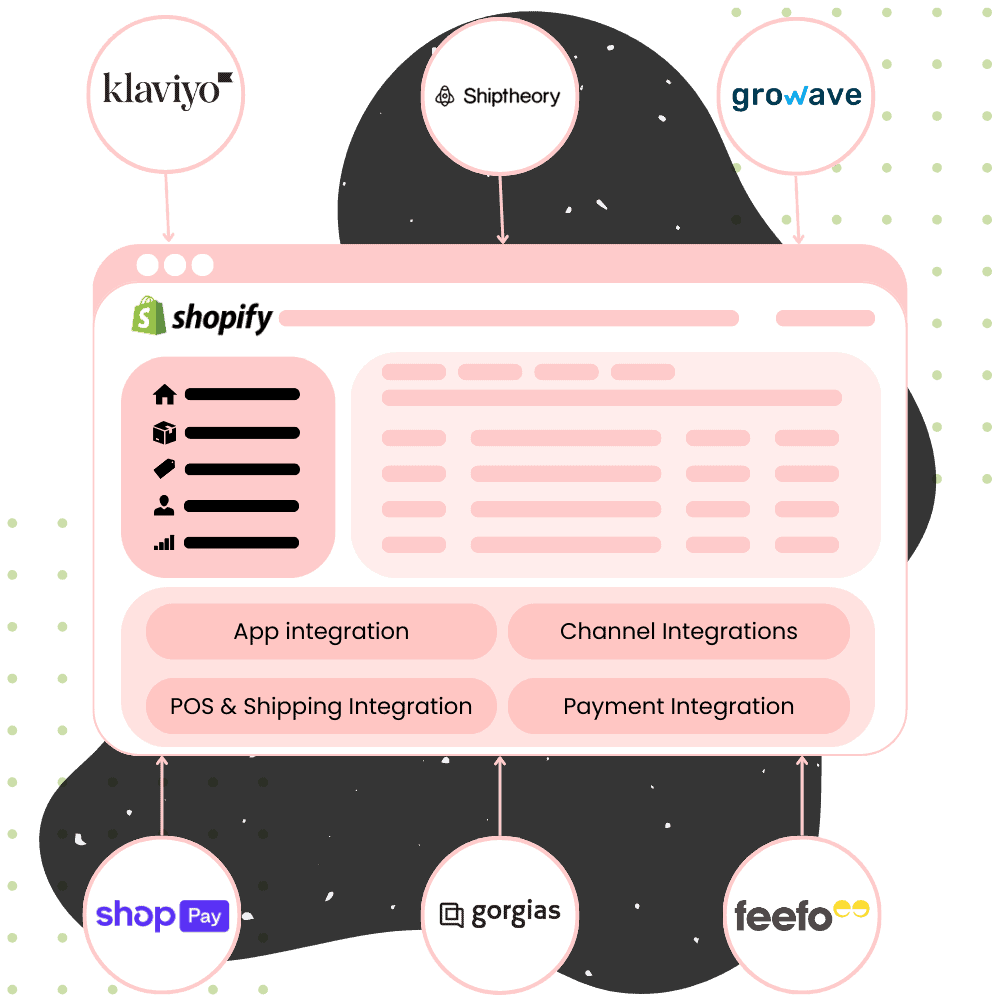
An order fulfillment process that is fragile and prone to intermittent or consistent failures not only stops you from spending time on productive things but can also damage relationships with customers.
At Deploy, we focus on making sure neither of those things happens. We create ecommerce environments that operate smoothly, providing you with peace of mind that everything is working as it should be, allowing you to get on with productive work.
Our Shopify integration specialists at Deploy have extensive integrations experience and a blueprint for a diligent, tried and tested process. By working with us and utilising Shopify’s integration capabilities, you’ll have a tailored environment that works.
Shopify Marketing Services.
A pivotal part of your ecommerce operation is your ecommerce platform. But an equally important element is the marketing strategy and related activities that you carry out to drive visibility and awareness of your brand and its products.
So it stands to reason that your platform should integrate seamlessly into your activities, connecting smoothly with digital marketing technologies and welcoming hard-earned traffic with tailored user experiences that convert.
With a multi-disciplined team including UX experts, ecommerce developers, digital marketing specialists and former ecommerce managers, we understand challenges in depth, and we can help you overcome them and excel in your industry.
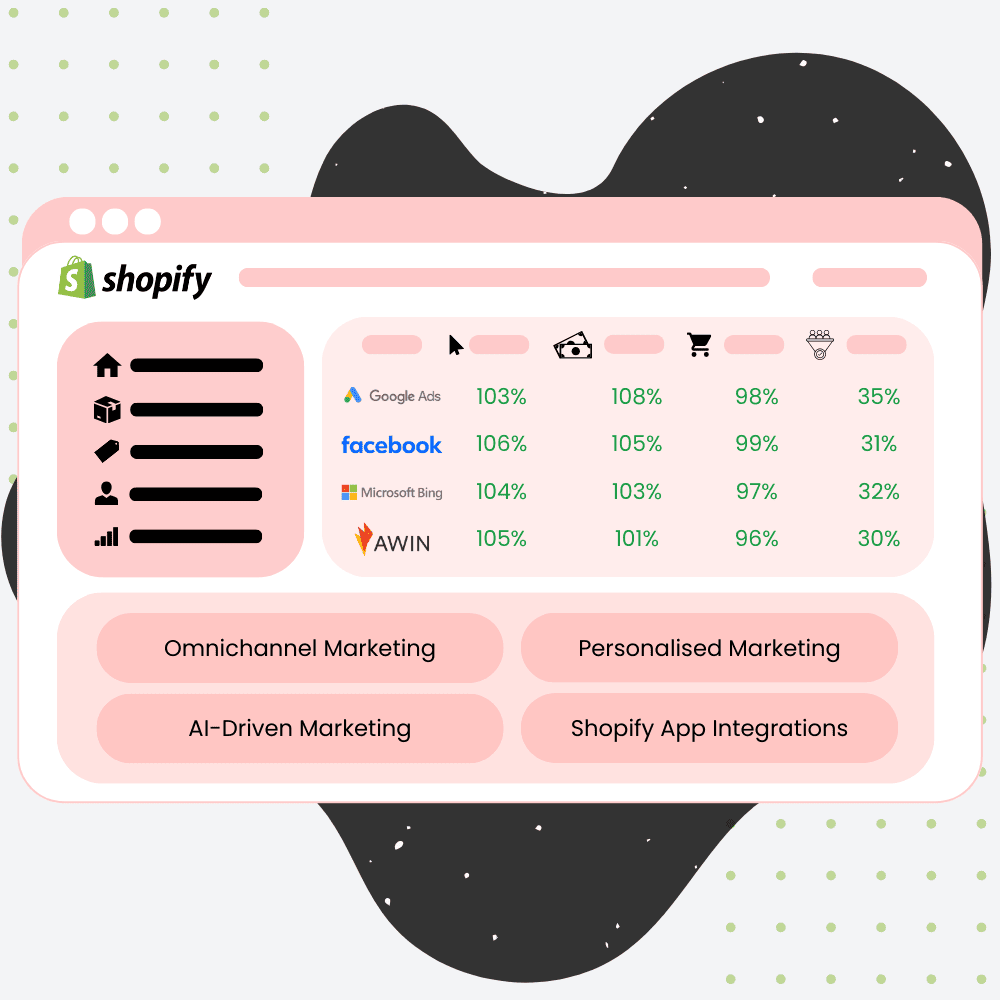
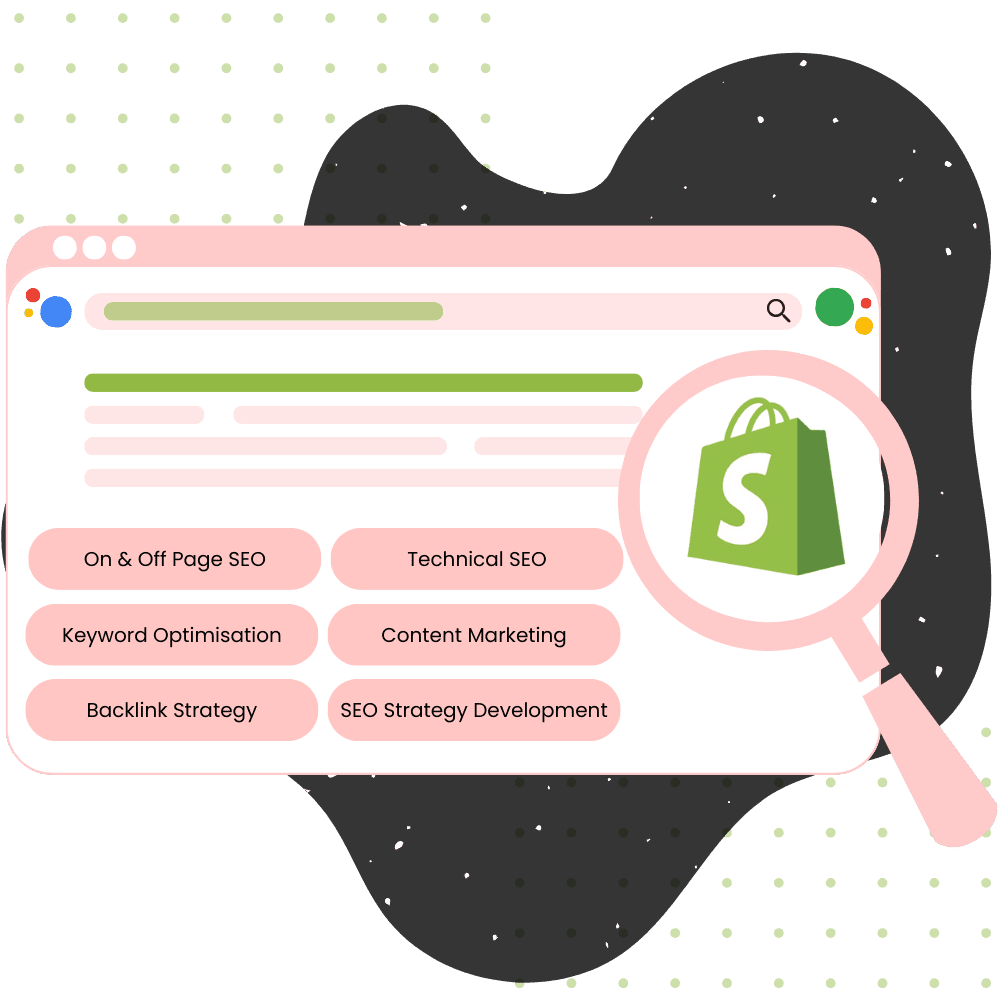
Shopify SEO.
If you’re looking to make your Shopify store more visible, Shopify SEO is the way to go. It involves optimising Shopify’s platform for maximum visibility and reach, so that retailers and brands can get the most out of their Shopify store(s).
Effective Shopify SEO means improving the store’s rankings in search engine result pages, ensuring better visibility on the web.
Through keyword research, content optimisation and other techniques, Shopify SEO can help any Shopify store better target its audience and reach people who are already looking for their products or services.
Shopify PPC Advertising.
Shopify PPC (Pay Per Click) is a powerful option that every ecommerce business should be using. Paid ads provide many advantages to businesses, such as reaching a wider customer base, improving brand visibility, and creating more online sales.
Through Shopify PPC, businesses can gain awareness on platforms like Google Ads, Facebook Ads and Bing Ads with customised campaigns for their products and services.
PPC helps businesses to get higher quality traffic that is precisely targeted based on the shop’s preference. When Shopify PPC is done correctly, it can bring customers in a cost-efficient way that eventually translates into higher ROI. Optimising Shopify PPC efforts continuously will ensure success in any respective business.
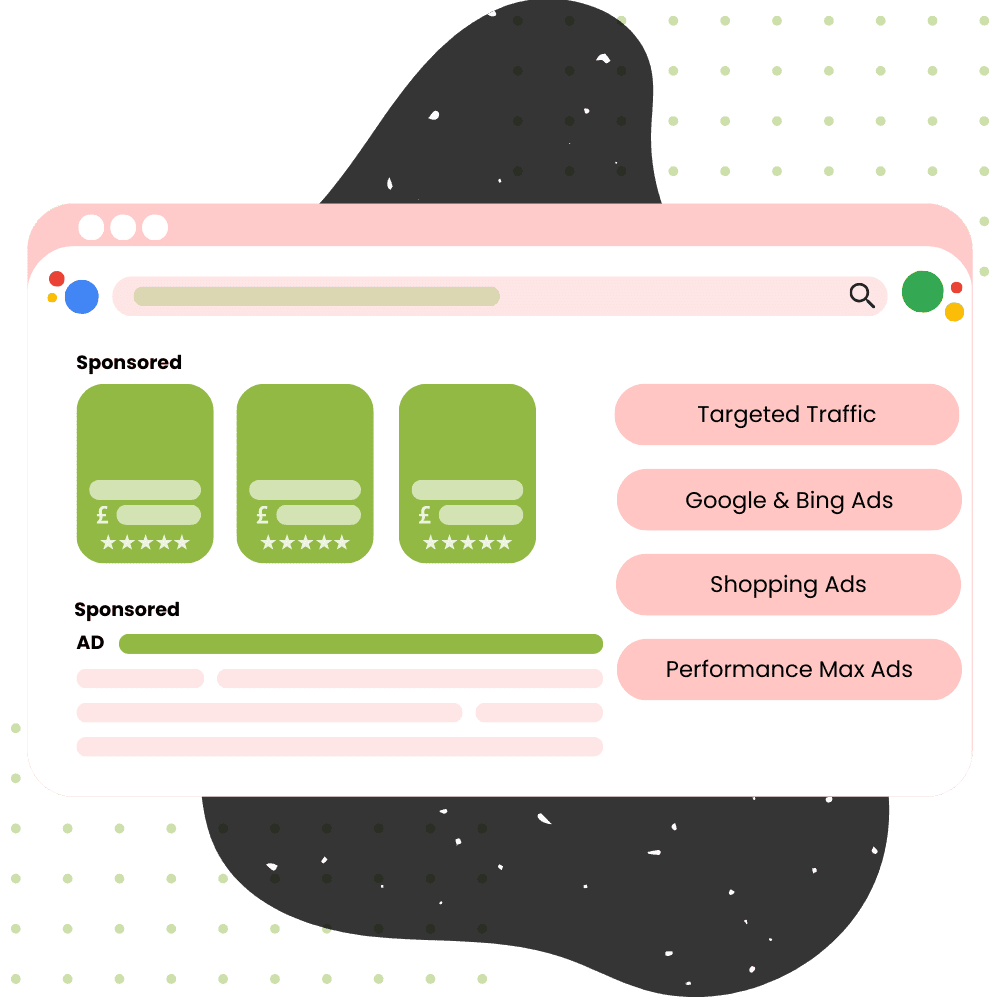
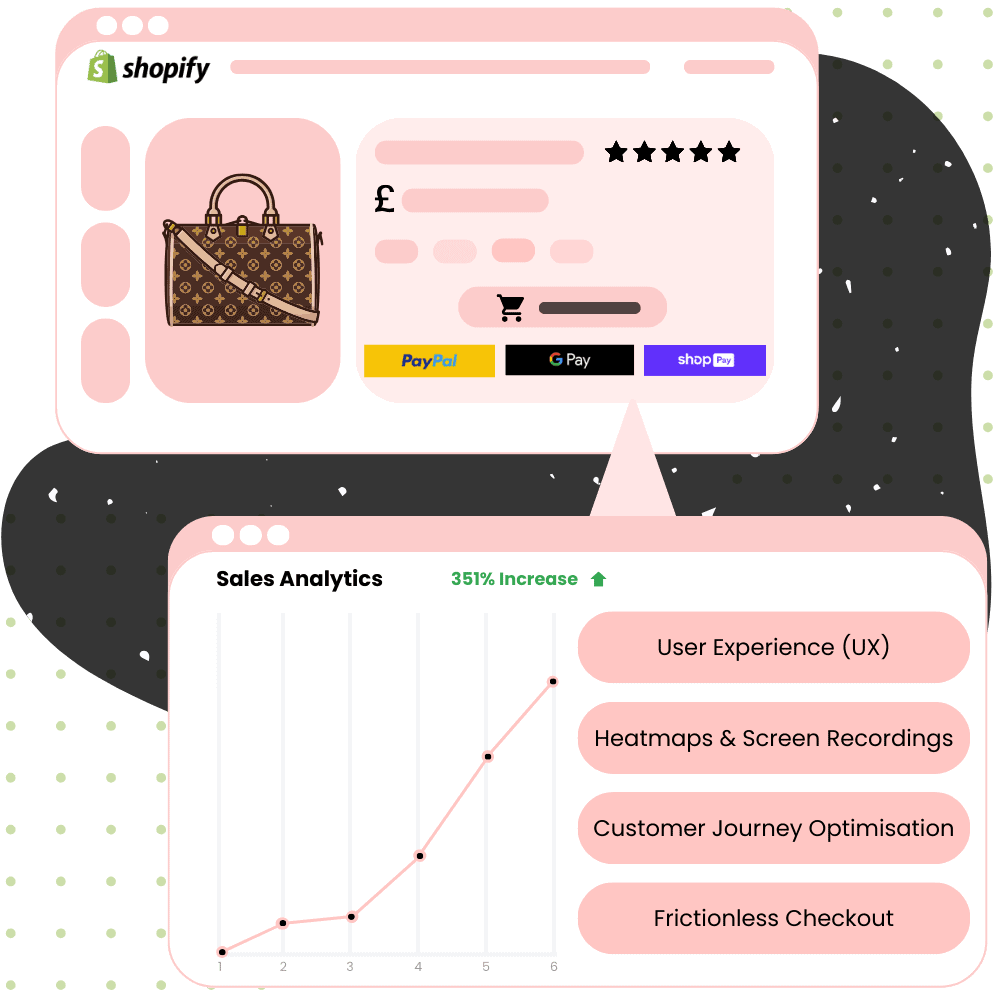
Shopify CRO.
Shopify CRO (Conversion Rate Optimisation) is an invaluable service for any ecommerce store that seeks to turn visitors into buyers. It involves making incremental changes to aspects such as user experience, design, offers, or pricing that result in a higher rate of conversion.
CRO allows business owners to systematically identify and make improvements across their Shopify website with the end goal being increased revenue. Our team of Shopify experts use Shopify CRO techniques to help drive more customers and maximise results from Shopify stores.
Shopify Email Marketing.
Shopify email marketing is an effective way to communicate your brand’s message and promote new products and your latest promotions. With Shopify email marketing, you can segment audiences, send targeted and personalised emails directly to customers, automate campaigns, track results and more.
You can use Shopify email campaigns to grow loyalty, increase sales, and inform customers about updates, news and upcoming promotions. So if you want to make the most out of email marketing, talk to our team about our Shopify marketing services.

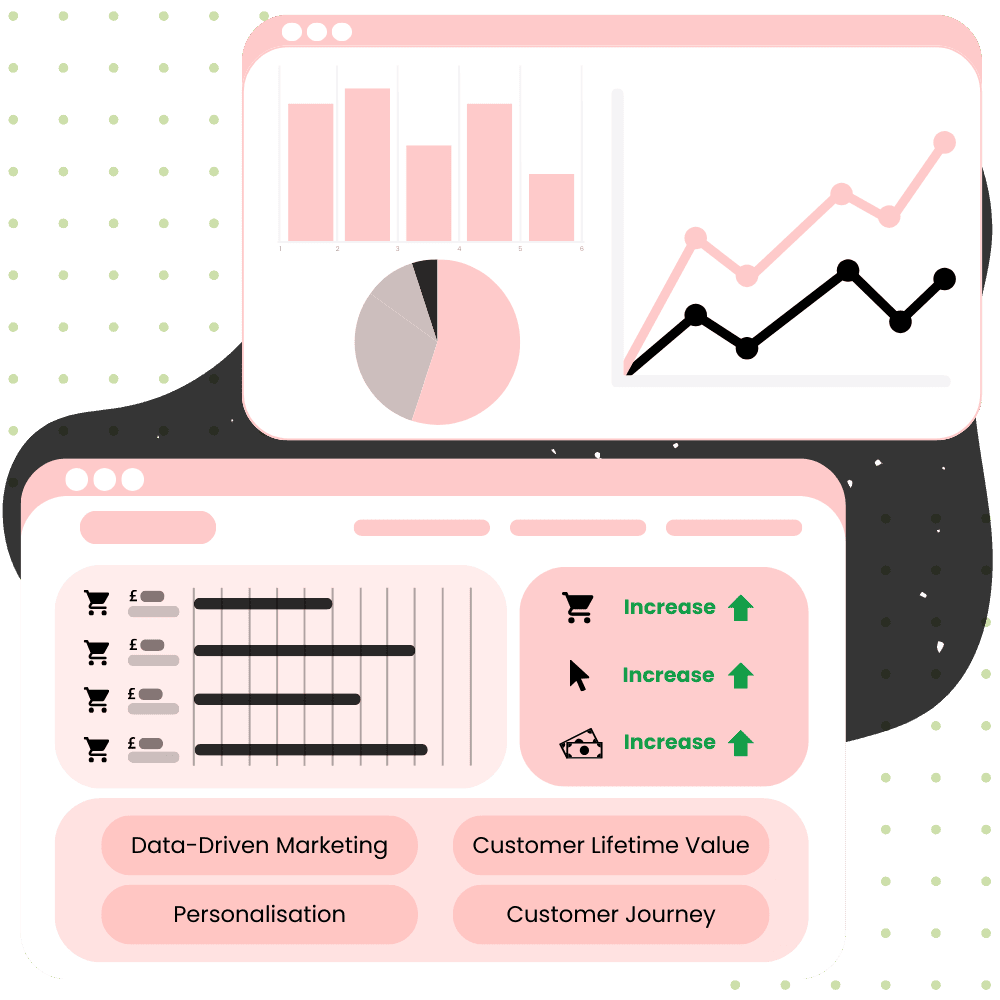
Shopify Digital Marketing Strategy.
A digital marketing strategy is key to gaining an upper hand in the digital marketplace. It involves developing a plan that outlines the specific digital tactics used to promote your products, as well as how these strategies will be implemented and measured.
When constructing your digital marketing strategy, it is important to consider the channels through which you will reach customers including search engine optimisation (SEO), paid advertising (PPC), email, affiliate marketing, social media marketing, conversion rate optimisation (CRO) and growth marketing as well as a timeline for executing your plan and continuously evaluating its effectiveness.
Shopify Affiliate Marketing.
Affiliate marketing is an efficient and cost-effective method of generating more sales through a network of affiliate websites. With affiliate marketing, the affiliate partner receives a commission whenever their visitor or customer completes the desired action, such as purchasing a product or enrolling in a subscription service. This can help expand and diversify your customer base by reaching new audiences who have not previously interacted with your brand.
The advantages of affiliate marketing – access to a broader audience, scalability of efforts and improved ROI – make it an attractive option for companies looking to grow their bottom line.
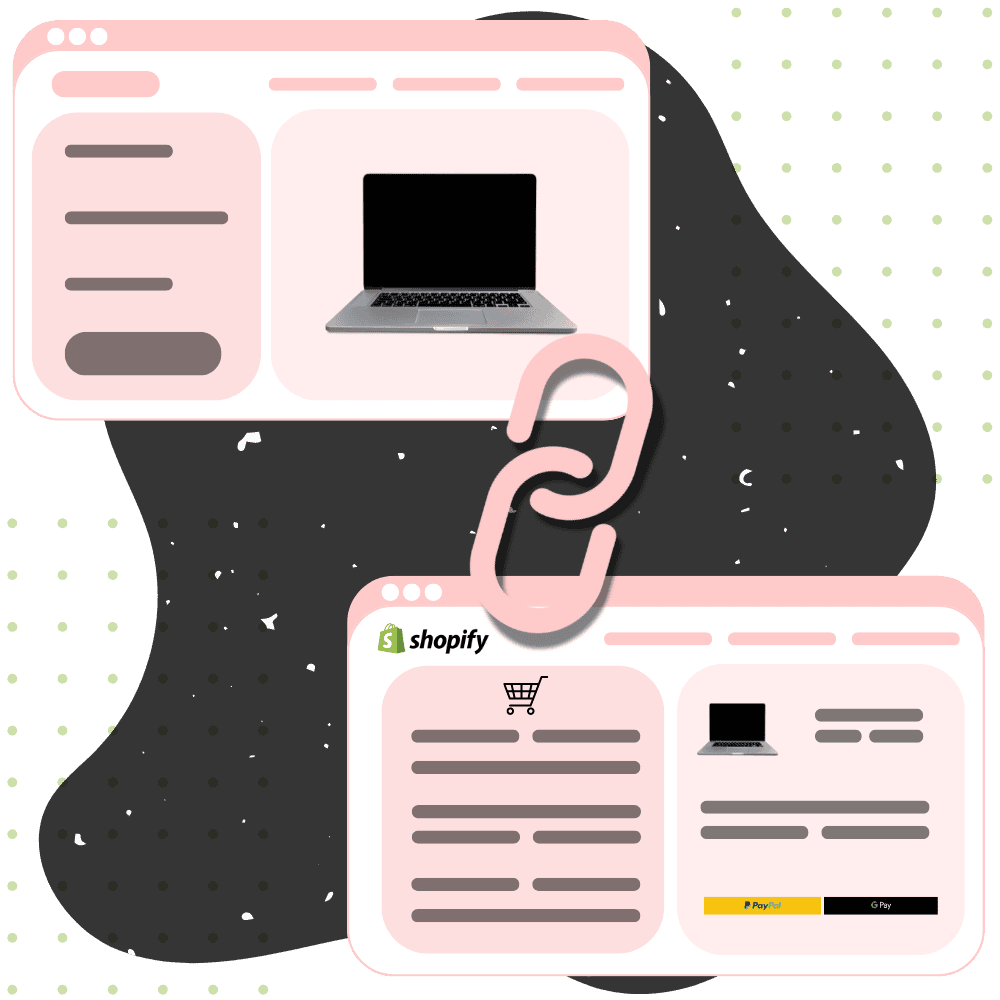
Shopify Agency FAQ’s:
Do you have any questions about Shopify or Shopify with Deploy eCommerce? Check out some of our frequently asked questions and answers:

